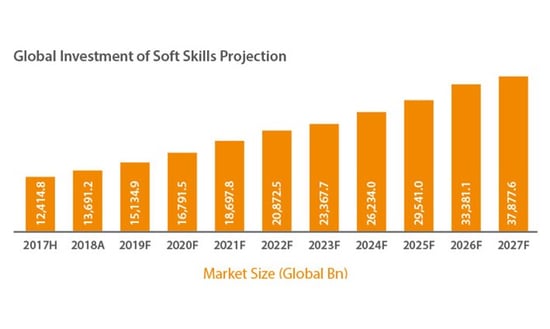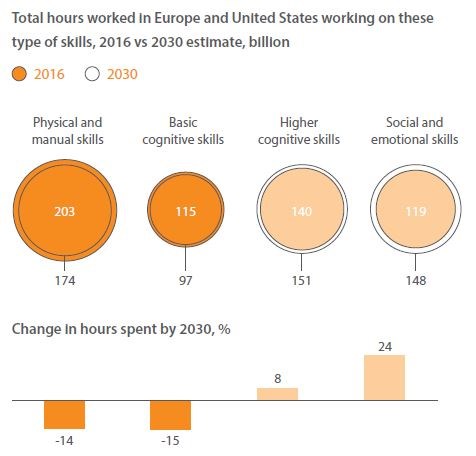The last ten years have been a rollercoaster for leaders in almost every industry and country. The economic crash of 2008 had such a profound impact that levels of productivity are still lower than they were all those years ago – and yet advances in technology are moving at such speed that we simply can’t predict what the future will look like for many industries. It’s a huge challenge for leaders to enable productivity today, while trying to predict what will be needed in order to be successful tomorrow.
So much of the future world of work can seem uncertain. Leaders are wrestling with questions such as:
How will my organisation have to evolve to stay ahead of competitors?
What shifts in strategy, focus, and investment will be required?
Who has the skills and expertise to lead us through all-encompassing change?
Will new markets open up through smart implementation of new technologies, and how can those customers best be served?
Human skills investment is exploding
It’s impossible to tell what opportunities will arise in the next few decades. What we can tell you though, is that people, and their magnificent and irreplaceable human skills, will never be obsolete. It may seem counterintuitive, but in this age of rapidly advancing technology, human skills are becoming ever more vital in successful organisations.
There’s a worldwide rise in soft skills investment that tells its own story. 2019 saw $15 billion invested in soft skills in the US alone, and that’s predicted to rise to around £38 billion in the next seven years.
 The smartest leaders know that the hard skills needed in the coming years can’t yet be predicted – but they do know that the forecasted changes will require people whose human skills are second to none. The organisations which see the most successful growth will be those that hire based on human skills such as resilience, agility, building successful relationships, leading with vision and heart, excellence in communication, giving and receiving developmental feedback, and a willingness to be open, coachable, and adaptable.
The smartest leaders know that the hard skills needed in the coming years can’t yet be predicted – but they do know that the forecasted changes will require people whose human skills are second to none. The organisations which see the most successful growth will be those that hire based on human skills such as resilience, agility, building successful relationships, leading with vision and heart, excellence in communication, giving and receiving developmental feedback, and a willingness to be open, coachable, and adaptable.
Technology is an enabler of humanity
There’s a recognition that, while innovative tech may be an enabler of great relationships, investing in human skills is going to become the key differentiator in many industries. In part that’s because leaders recognise that the changing world of work will require us all to be supremely adaptable, comfortable adopters of new technologies, and able to roll with new processes and organisational structures. But it’s also because new technologies are going to free us up from much of what now occupies us – the dull-but-necessary back office work, such as order management and administration. For many people, their working lives will be gloriously unburdened by innovative technologies, but leaders will have to make smart decisions about how to fill the gap that’s left behind.
Research suggests we’ll fill our time instead with wringing value out of human relationships; building stronger and deeper connections with customers who we can then truly partner with; mentoring and coaching those at the beginning of their careers; working in numerous squads and streams that each require something different from us. All of these changes and more will require emotional intelligence more than anything that has come before. Just look at these numbers and think about what it’ll mean for your organisation.

This shows that within ten years, organisational reliance on physical and manual skills, and basic cognition will shrink. Instead, organisations will be recruiting and training people who can demonstrate higher cognitive skills, as well as highly developed social and emotional skills. Change of this scale is going to involve a lot of organisational redesign: who can be retrained and in which areas, who has transferable or untapped skills that can be used, what skills are there simply no room for as we shift strategic focus.
The time to plan to invest in human skills was a decade ago: the time to actually invest in human skills is now. Your organisation is likely to have ambitious plans to increase its size, impact, or profitability; the best way to achieve these goals is to commit to the development of your people, who will make your strategic goals a reality.
To find out more about the changing world of work, download our eBook now.

